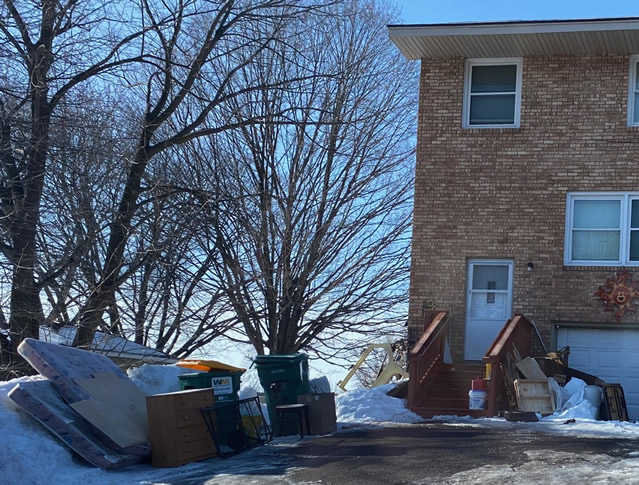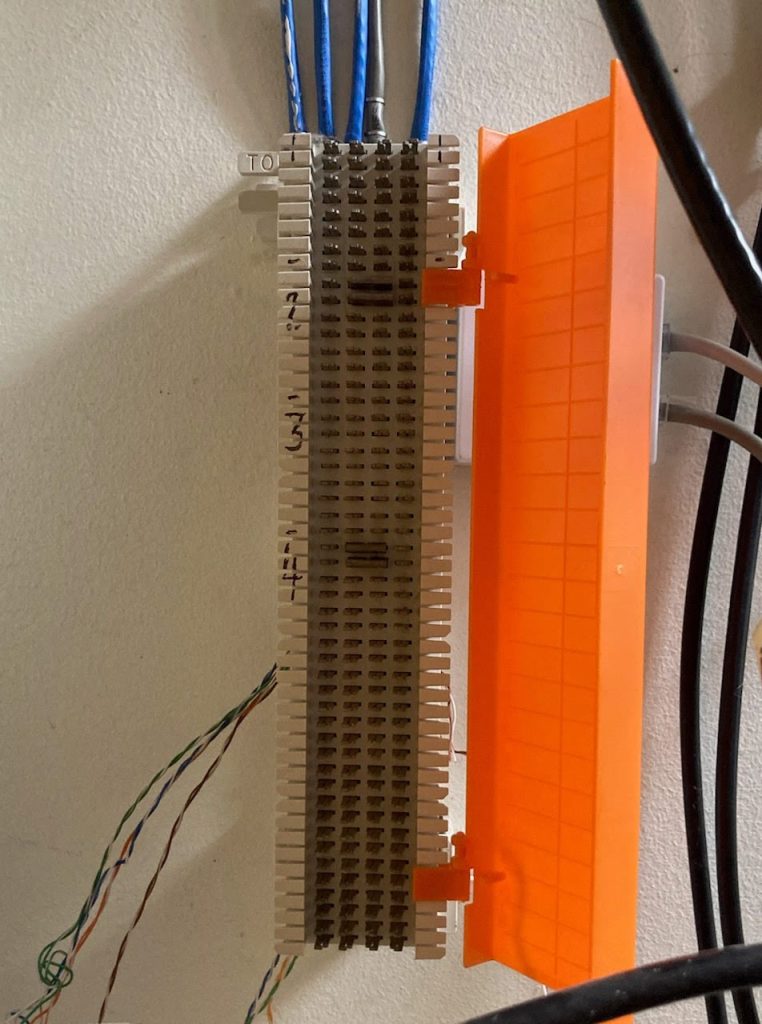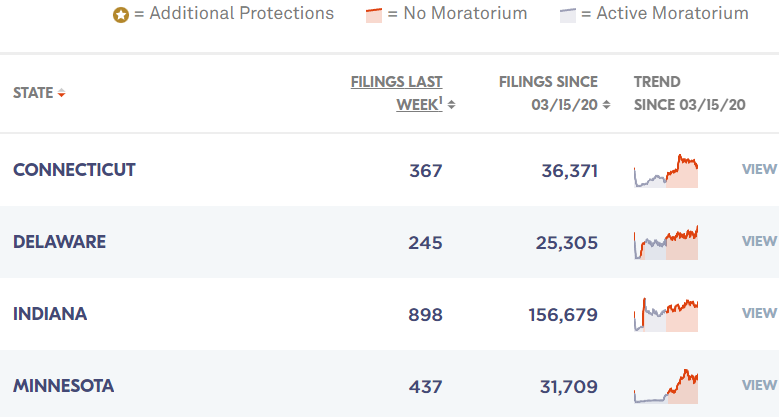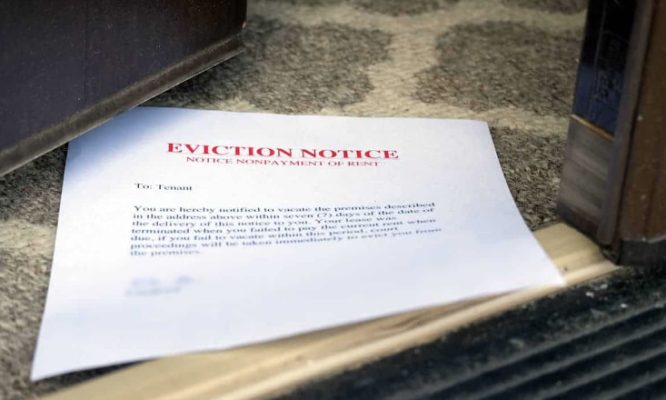If you manage your own properties, inevitably you will encounter professional tenants, and other than a huge fire or mold damage, they’re about the worst thing that can happen to you. It’s important to keep the big picture in mind as the investor and this is just part of the business. I would venture to guess 3-5% of applicants for your units will be professional tenants so it’s imperative you know how to spot and avoid them up front. My experience and prior pain allows me to avoid most of them these days, but take note, they’re looking for inexperienced landlords to prey on specifically and they’ll cost you ten thousand dollars to get rid of. No joke. Given the amount of effort and time professional tenants invest into their profession, why they don’t instead use that time and energy to earn money and uphold their commitments is beyond me. Also take note, tenants falsifying income and other information on the application has doubled recently from 6% of applications to 12% (see this article )!!! If you’re a trusting person and assume people act with good intentions and with integrity, you will get bitten more often.
What is a Professional Tenant
They Pay Rent Late Often and Always Have an Excuse
Professional tenants will frequently pay rent late, and will push you to your limits a little bit more every month. They will try to get to you at an emotional level with their misfortunes. Every month is an excuse and I feel like I’ve heard them all at this point:- They had “vehicle repairs” that took priority over paying your rent
- They are in the hospital
- “The bank is closed”
- “My paycheck is lost in the mail”
- “I mailed the check last week”
- “I’ll have the payment on Friday” and then Friday comes and goes and then it becomes Wednesday and on and on.
- “My employer cut my hours” (weeks ago and they don’t bother mentioning until rent is a week late)
They’ll reference their (free) lawyer and show off knowledge of tenant laws
Tenants in tenant friendly states like MN get access to free resources and a free lawyer to consult with and represent them. They’ve been through the eviction process before and know how to cause delay and get out of paying their obligations.They’ll say the home is uninhabitable and will withhold rent due to maintenance issues
Professional tenants know they can withhold rent due to maintenance issues. This allows them to pay late and not get evicted. It takes time and costs money for the maintenance issues to be handled or proven as a “non issue”.They’ll have a charity make payments on their behalf.
They may have a non profit charity pay their security deposit for first month of rent. They know when and where the free money is.They’ll make partial rent payments
Professional tenants know the how the legal system works. If the landlord accepts even one dollar of rent, it forfeits their right to evict for that month’s unpaid rent. I once had a professional tenant paying on the last day before eviction leave an envelope in the garage with half of what she owed. She knew what she was doing. Tip: have a clause in your lease that states accepting partial payment does not wave your right to evict (this works in MN).They won’t pay the late fee
Professional tenants know you won’t spend hundreds of dollars and time filing an eviction because they didn’t pay their little late fee. They’ll bank on you getting tired and wiping it from their ledger.They’ll pay rent in cash and may produce fake receipts
Just one more way to avoid having proper transaction history is paying in cash and then it becomes a matter of he said – she said.How to Identify a Professional Tenant During Application
Listen to your gut and spidey-sense when considering applications for your home. If something feels off or out of the ordinary, dig deeper and invest extra time screening them as thoroughly as possible to identify the professional tenant. Take the time to call their employer and past landlord references. I’ve seen people lie about these; they’ll list their friends as a past landlord and have already prepped them to give a glorious review. Tip: call the references after hours and listen to the voice recording. You can tell by the recording if it’s a professional business (property manager) or general public.
Obvious red flags when you first meet them:
- Let’s start with the obvious one that actually doesn’t help very often: they have an eviction, rent escrow, or other court judgements on their record.
- Surprisingly I don’t see this very often, and professionals may not have any of this on their record because the records can be “expunged” for a small fee if they are victorious. Even if there is an eviction record or rent escrow court record on their background and they were victorious, the fact that it happened in the first place is a red flag and you should proceed cautiously. In most cases issues can be resolved between reasonable people (landlord and tenant) and the fact that it went to court requires and indicates a level of stubbornness and frustration from one side or both.
- They’ll try to impress you with a handful of cash that they want to give you.

They will ask “are you the owner” of the home?
-
- They intentionally want to take advantage of smaller mom and pop landlords from an emotional level that aren’t an strict on rules. They will have a story and are looking for that one special person to give them a chance.
- Tip: even if you do own the home, tell them you are the “property manager” as it keeps the relationship more professional and allows you to consult the higher power (owner) when they make requests.
- They don’t have verifiable income and only work for cash.
- Surprisingly cash jobs make up 10-12% of the US economy! However, the real red flag is when they literally only have cash and no bank account, which means collecting rent will be a PITA because they cannot make online rent payments either. If they don’t have a bank account, then they intentionally don’t want their money tracked; they’re hiding it from prior court judgements that will garnish their wages and/or they are avoiding paying taxes, which becomes a character flaw with lack of integrity.
- They are in a hurry and may pressure you to make a quick decision.
- They’re in a hurry likely because they’re being forced out of the home they’re currently renting and/or they don’t want you to have enough time to call their references.
- They are quick communicators with you as finding housing is difficult and is their top priority. They may not have anything else going on, like a job, so they are able to communicate this way.
- They are extremely friendly, tell you what you want to hear, and speak to you like a fast talking and confident sales person.
- This isn’t always true, but commonly, people that are professionals at taking advantage of others are experts in dealing with people as this is how they get what they want from them.
- I’ve had professionals tell me they are “strong Christian’s” and just want to be in an area near their child’s christian private school for example (even while being on section 8 government assistance).
- They may speak very slowly and softly
- The one of their voice is very compassionate and they’re acting like your best friend.
Professional tenants must work hard to find housing, so they’ll sell themselves the very best they can to you.
- The one of their voice is very compassionate and they’re acting like your best friend.
- They have a zero credit score and/or zero credit history.
- I’ve seen this more than once by people 30+ years old. Early on I rented to one of them and this professional tenant cost me $10,000. In today’s culture, it must take an enormous amount of effort to live for a decade or more with no traceable transaction history. Sometime is going on here and they’re hiding something; this doesn’t just happen by accident.
- Gaps in rental history.
- They evidently lived somewhere and wherever it was they don’t want you to know about it. Often times they will replace this with “living at home” or “moved back home with parents” to skirt around it.
- They are currently in a “bad situation.”
-
- You have a heart and listen to their sad story about how somebody is treating them badly and they just want their family to be safe. There are probably legit cases like this that happen to great people, but I’ve found this to be a red flag. Have your good tenants ever been in these situations, and did the person really have nothing to do with getting into the situation?
At the end of the day, trust your gut. If something doesn’t seem right, don’t approve them, or charge them first AND last month’s rent up front to reduce your risk. With property management coaching we can talk about proper ways to deny their application. I’ll even review it with you.
How to Deal with a Professional Tenant During Tenancy
The best experience that can prepare you for dealing with a professional tenant is being a parent, have experience managing people at work, being burned by other professional tenants in the past, or having a rental property management advisor use their experience to assist you. You know how your children push your buttons? Well, professional tenants do as well, so treat them like children with clear communication and without budging on the boundaries you establish. If you give a little, like allowing rent to be paid a few days late or waiving a late fee, it instantly becomes the new standard.
Recommendations for dealing with professional tenants while they’re renting your home:
- Set a reasonable “late limit” in your lease of 8 or 10 days past the due date and stick to it. The tenants need to know where the line is and when an eviction will be filed. They’ll use every hour of this limit. Communicating it up front and clearly makes this easier so you don’t feel like the bad guy as they’ll know what’s coming.
- Once rent payment is within 3-4 days of the late limit, require them to make payment via certified funds like a money order.
- Submitting an ACH payment online or sending a check in the mail is prone to delivery problems or bouncing, and it’s times like these right at the deadline when such problems appear and the tenant knows it and will use them as excuses like an “oops”. They’ll say “I have the money in my account, I don’t understand why it bounced”. In any case, they do it to buy themselves another week.

- Ensure your late fee stings.
- I’ve had late fees as low as 2-3% of the rent due and nobody bats an eye at those. In MN the maximum late fee is 8% of the amount owed, and I recommend your late fee be in the 7-8% range. Your late fee should be more costly to them than other late fees they are considering.
- Have professional service people repair & document their opinion on maintenance issues that may be used to withhold rent.
- A professional tenant will commonly claim mold is in the home and that it’s uninhabitable, but continues to live there anyway. I once paid for a $350 mold air test in this situation and that nearly resolved it with the tenant and did from a legal standpoint. The professional tenant will likely move onto some other maintenance issue from here.
- Having your handyman “look at it” a couple times isn’t going to hold in court.
- Double communicate everything in writing and take a lot of photos and videos.
- It’s amazing how you can go from having a text or email conversation, and then suddenly they miss some of your important communication about deadlines. “I didn’t get that email” is so common, so now you also get a text saying the same thing at the same time. When they don’t respond after a day, follow up and request that they acknowledge receipt of the message.
- I’ve dealt with professional tenants that blatantly lie and accuse the property manager / landlord of ridiculous things as a way to fight back against their eviction and make the process more difficult. It draws out the legal process and costs everybody more time and money. Documented all interactions via email or text, and having photos or video of every time you enter their rental unit is needed.
How to Get Rid of a Professional Tenant
Getting rid of a professional tenant is difficult and frustrating, especially if you’re in a tenant friendly state. You have some choices, and you lose in all, so it’s a matter of playing “tenant poker” and the best option is finding a way to lose the least.
- Offer them “cash for keys”.
- Yep, they owe you thousands of dollars already, and you’re going to pay them to leave. Offer them $750+ ($500 is not enough in my experience) to leave in 8-10 days, and all their possessions including trash must be gone as well to receive the cash. Note, there is high risk of them not actually leaving within the week because they won’t be able to find a new home that quickly and then you’re out another week of rent.
- File the eviction early.
- The professional tenant will string you along saying I’ll pay you tomorrow or on Friday, and this will go on and on and on and on. If no confirmation from tenant on accepting cash for keys after a couple days, file the eviction. Don’t wait another day. File it early and just get it started b/c as you’ll see below it takes a long time to get them out using the legal system.
- File the eviction even if the end of their lease is near.
- Plan on them making things difficult, like being a holdover tenant, which means they don’t leave after your lease ends and you’ve given notice of non renewal.
- By the way, the moment you notify the professional tenant that you won’t be renewing their lease, you won’t see another dime in rent from them, so try to do it just after a rent payment is made and it must be “one period” of notice or greater – generally 30 days.

One of mine where the tenant is being evicted for non payment of rent. Guaranteed at least one box spring and mattress will be left behind.
Evicting a Professional Tenant
The professional tenant has been a pain during their entire tenancy, and no matter what approach you take, evicting a professional tenant will take a lot of time and money. There is no way around it and you’ll just have to learn from these mistakes and do better at avoiding them next time. Why do professional tenants get away with it? Because our laws favor them, especially in tenant friendly states like Minnesota. Here’s how it usually goes:
- Tenant is 3 weeks late on rent and hasn’t paid following your threats, so you file the eviction. This costs you $402 for the filing fee (as of 2023 in MN), and another $800 in legal fees to your lawyer (this varies).
- The court is backed up and after 1 week they finally schedule a court date 4-5 weeks out.
- Hearing occurs and if they can’t find a loophole on how the landlord failed to provide proper notice or anything else, tenant is given one more week to pay up.
- Tenant fails to pay so a “writ” of recovery of the home can be requested from the court. This takes a few more days up to a week. Remember nothing with the government happens on the weekends, so that’s 2 out of 7 days plus dozens of holidays they’re closed each year.
- Landlord finally gets the home back and it’s pretty much guaranteed that it’ll be trashed. Hauling the garbage away will cost you a grand, and you may even need to store it at the property or another location for up to 30 days.
All said and done, the process takes 9-10 weeks to get them out. Then the cleanup begins and then showings start. You’re out 3-4 months of rent, plus the cost to haul away trash and turn. $10,000 goes pretty quick here.
Be sure to document everything in writing; no phone calls. I will email AND text all communication if responses are slow, and will follow up after a day because guaranteed the excuse of “I didn’t get the message” will be used. Respond in a reasonable amount of time to the tenant or their free lawyer may accuse you of acting in “bad faith”, which might buy the tenant more time if they challenge the eviction.
Note: during this time the tenant is extremely upset with the property manager / owner, and may intentionally cause additional damage to your home. The pic on the right is one of my experiences where the tenant pulled out all the telephone and internet wires, disabling these services to the entire building for a week. If you don’t have security cameras installed in public places of the building, now would be a good time to have them installed.
I highly recommend seeking legal aid from a lawyer in your state that is experienced with the intricacies of your states laws. They may even know the local judges and how to present your case to them for best results. If you’re in Minnesota and your property is owned by a company / LLC, depending on the county you’re likely required to hire a lawyer and cannot self represent.

Most times when I go to eviction with a tenant, the eviction gets “expunged” from record as part of the settlement as if it “never happened” from the court or tenant’s history standpoint. I feel this is a dis-service to other landlords trying to screen tenants, but that’s the reality and while I wasn’t able to find the numbers, in my own experience on every eviction case Iv’e had the tenant and their lawyer want an expungement, and getting it as part of a settlement usually happens. If you figure 32K evictions occurred in MN in the last 3 years (this number is low b/c it was during the pandemic where you could not evict), I’d estimate at least that many more were dis-missed and are not even on record. In MN, and likely in most other states if not all, as long as the tenant leaves (doesn’t even have to pay what’s owed) before the eviction court date, or they settle and pay what’s owed with the landlord before court trial, it’s expunged.

Can You Win an Eviction Trial?
The odds of you “winning” an eviction trial high depend on how tenant or landlord friendly your state is. By winning, I mean the judge will consider what your lease agreement says and will uphold the terms of the agreement. In Minnesota, the “greedy rich” landlords are the bad guys and the deck is stacked against them as most if not all judges in Minnesota are tenant friendly. I’ve had trial cases where the judge gives the tenant and landlord one last attempt at coming to a separation agreement, outside of what the lease says, and when that doesn’t happen they toss your case on the bottom of their pile and revisit it in 80-90 days. They know this will cost the property owner another 3 months of lost rent and they’ll challenge you to appeal them on their decision.
This is the reason when investing you should consider if the state is tenant or landlord friendly.
Having Second Thoughts?
Yep, these situations are probably the worst part about owning rental property. It’s just part of the business and requires an experienced property manager to weed most of them out. Sometimes they still get past the screening; it’s impossible to avoid them all. As the owner, it’s important to keep your focus on the big picture and long term plan and goals of being a real estate investor. If situations like this would cause you to not be a real estate investor all together, I highly recommend hiring a property management company to take care of this for you. In rough parts of town where professional tenants are more prevalent, having a good property manager is essential in keeping your sanity.


